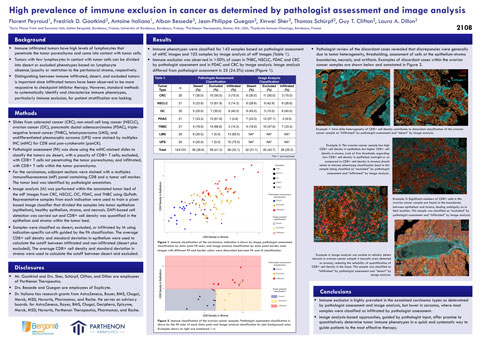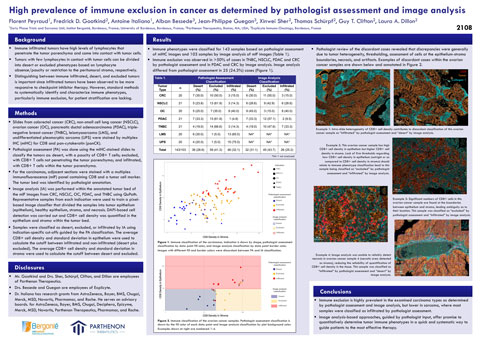BOSTON--(BUSINESS WIRE)--Parthenon Therapeutics, a precision oncology company discovering and developing a novel class of therapies that reprogram the tumor microenvironment (TME), today presented data at the AACR Annual Meeting 2023, on the high prevalence of immune exclusion in select solid tumor types. The data further support Parthenon’s planned Phase 1 clinical trial of lead candidate PRTH-101, a novel Discoidin Domain Receptor (DDR1) inhibitor which targets DDR1-directed collagen barriers in immune excluded tumors. (NCT05753722)
Patients with immune-infiltrated tumors have high levels of tumor-killing immune cells in contact with tumor cells and often respond to existing immunotherapies. However, most patients with solid tumors lack immune cells in physical proximity to tumor cells. This can be due to collagen barriers that prevent immune cells from reaching tumor cells in immune excluded tumors. DDR1 contributes to collagen barriers in the TME by aligning collagen fibers that prevent the infiltration of immune cells.
“These data revealing the high incidence of immune exclusion in a number of cancer types demonstrate the large unmet need that exists in the field of immuno-oncology, which often does not address barriers in the TME that prevent immune cell interaction and killing of tumor cells,” said Laura Dillon, PhD, Vice President of Translational Medicine & Bioinformatics at Parthenon Therapeutics.
The findings released today show that greater than 40% of patient tumors in triple negative breast cancer, non-small cell lung cancer, pancreatic ductal adenocarcinoma, and colorectal cancer are immune excluded based on both pathologist-defined immune phenotypes and image analysis. Moderate levels of immune exclusion were observed in ovarian cancer, and low levels in sarcoma subtypes. Furthermore, Parthenon proposed methodologies to systemically characterize immune phenotypes– based on the analyses of immunohistochemistry images, demonstrating both the benefits and limitations of this approach as benchmarked against more traditional methods for defining immune phenotypes that rely on pathologist impression.
“There is a unique opportunity for PRTH-101 to address the largely neglected TME in patients with solid tumors. We look forward to providing updates in the coming months as we prepare to transition to a clinical stage company with the progression of our lead asset PRTH-101 into Phase 1 trials,” commented G. Travis Clifton, MD, co-founder, Head of Clinical Science at Parthenon Therapeutics.
These data were generated in collaboration with Institute Bergonié (PI: Antoine Italiano). The poster detailing these findings - #2108 - will be presented at the American Association of Cancer Research (AACR) Annual Meeting on Monday, April 17, 2023.
About PRTH-101
PRTH-101 is a therapeutic antibody that specifically binds to and blocks DDR1, a protein expressed on tumor cells that binds collagen to make a minimally permeable physical barrier that blocks immune cells from interacting with and attacking tumor cells. Thus, these “immune cell-excluded” solid tumors are resistant to attack by the immune system (as well as other existing therapies). By disabling DDR1, the collagen fibers lose alignment and loosen, creating gaps in the tumor barrier, thus allowing T-cells to enter and naturally attack the tumor. The creation of DDR1-directed collagen alignment does not appear to have a normal physiological surrogate and may therefore be unique to pathologies such as neoplasia, potentially allowing for relatively safe interventions. Thus, blockade of DDR1 represents a unique and “orthogonal” approach to stimulating the immune-based antitumor activity, and such blockade shows both single agent anti-tumor activity as well as marked augmentation of immunity enhanced by PD-1 blockade.
Tumor types which show particularly high levels of DDR1-associated collagen barriers include colorectal, ovarian, and non-small cell lung cancer. Currently, there are no approved drugs that target DDR1.
About Parthenon Therapeutics
Parthenon Therapeutics is discovering and developing a novel class of anti-cancer therapies that reprogram the tumor microenvironment (TME). Recent research has shown that the interplay of many cancers and their TME results in the creation of unique, non-physiologic barriers that markedly attenuate immune system attack. One approach utilized by PRTH-101 is to break down these barriers to overcome recalcitrant cancers. Based on rigorous, groundbreaking research, Parthenon is developing a portfolio of drug candidates to treat selected patients at the appropriate/ideal stage in disease progression. For more information visit parthenontx.com and LinkedIn.




